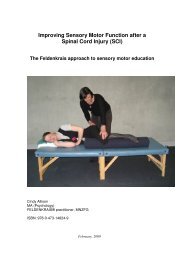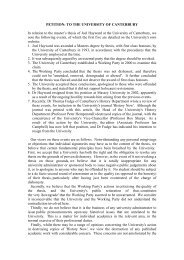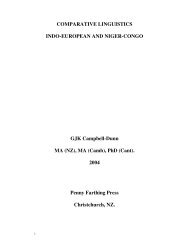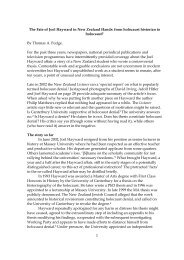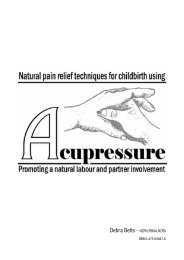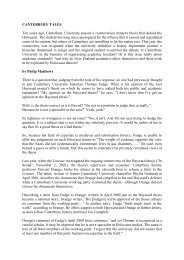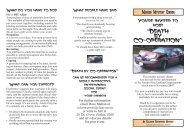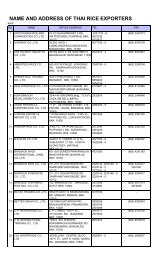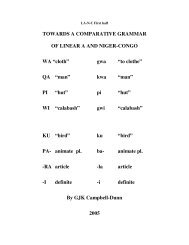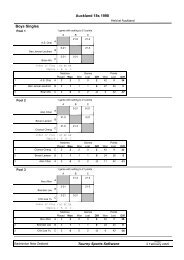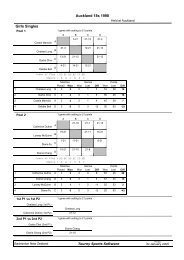Wairua and the relationship it has with learning te reo ... - Clear Net
Wairua and the relationship it has with learning te reo ... - Clear Net
Wairua and the relationship it has with learning te reo ... - Clear Net
You also want an ePaper? Increase the reach of your titles
YUMPU automatically turns print PDFs into web optimized ePapers that Google loves.
Te Tāhuhu o <strong>te</strong> Whare nei:<br />
Most students experience a growth in <strong>the</strong>ir spir<strong>it</strong>ual awareness starting<br />
from <strong>the</strong> time <strong>the</strong>y begin <strong>learning</strong> <strong>the</strong> <strong>reo</strong> w<strong>it</strong>hin Te Ataarangi, <strong>the</strong> first<br />
stage for students <strong>learning</strong> in an immersion s<strong>it</strong>uation was described by <strong>the</strong><br />
kaiako as <strong>the</strong> ‘Confusion stage’ when people find out things about<br />
<strong>the</strong>mselves, <strong>the</strong>y go through a whole lot of discovery, <strong>the</strong>y can be really<br />
<strong>te</strong>arful in <strong>the</strong> first six months (Rangihau 2004:4A,075-102).<br />
Your emotions can “run haggard” at times, “a lot of different emotions<br />
come out”, “emotions…that you never thought…you…possessed”, “you<br />
just want to tangi a lot” (Edwards 2004:1A,212). When “<strong>the</strong>y get<br />
up…<strong>and</strong> talk…all of a sudden” <strong>the</strong>y “just burst out crying” “<strong>it</strong>’s good,<br />
<strong>te</strong>ars always mean growth”, <strong>it</strong> “is <strong>the</strong> fru<strong>it</strong> of <strong>the</strong> wairua” (Rangihau<br />
2004:2A:321).<br />
It’s as if students can’t influence what is happening to <strong>the</strong>m, <strong>the</strong>y have got<br />
to get through this stage by opening up to <strong>the</strong>ir feelings <strong>and</strong> emotions<br />
allowing <strong>the</strong> wairua to begin to work for <strong>the</strong>m. Ra<strong>the</strong>r than control <strong>the</strong><br />
process, students get ahead fur<strong>the</strong>r by relaxing <strong>and</strong> letting <strong>the</strong> <strong>learning</strong><br />
experience take care of <strong>it</strong>self in<strong>it</strong>ially, so that in<strong>te</strong>gration can occur.<br />
“Some of <strong>the</strong>m don’t actually h<strong>and</strong>le <strong>it</strong> <strong>and</strong> leave…if you loose control<br />
of s<strong>it</strong>uations <strong>it</strong>’s really frustrating,…<strong>it</strong>’s really scary for people…<br />
circumstances like <strong>the</strong> rumaki thing…unsettle people so that<br />
<strong>the</strong>y…get…out of <strong>the</strong>ir comfort zones.…Learners…that have a cultural<br />
base…sort of sink into <strong>it</strong>…but…not hearing <strong>the</strong> <strong>reo</strong>, not being familiar<br />
w<strong>it</strong>h <strong>the</strong> cultural con<strong>te</strong>xt of <strong>the</strong> <strong>reo</strong>, <strong>the</strong>n <strong>the</strong>y find <strong>it</strong> really hard…a lot of<br />
Pākehā learners feel aliena<strong>te</strong>d…because <strong>it</strong>’s not familiar to <strong>the</strong>m…<br />
<strong>the</strong>y loose control of <strong>the</strong> s<strong>it</strong>uation…The ones that learn fas<strong>te</strong>r are <strong>the</strong><br />
ones that can let go fas<strong>te</strong>r…each student <strong>has</strong>…different letting go<br />
times…some won’t let go for a whole year…some will do <strong>it</strong> in <strong>the</strong> first<br />
week <strong>and</strong> some will do <strong>it</strong> in <strong>the</strong> first six months,…when <strong>the</strong>y do open<br />
up…<strong>it</strong> takes away blocks” (Rangihau 2004:4A,102-183).<br />
The comments above describe student reactions to <strong>the</strong> discomfort of<br />
immersion as experienced w<strong>it</strong>hin <strong>the</strong> Te Ataarangi <strong>learning</strong> environment.<br />
29



